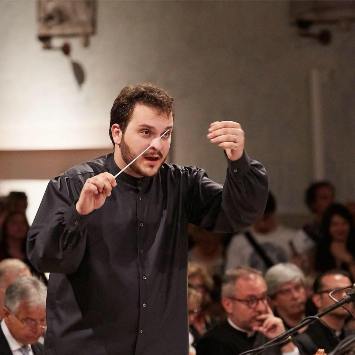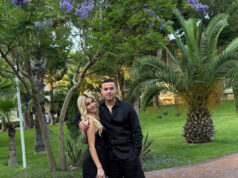BIOGRAPHY
Born in Trieste in 1997,
he began his first musical studies at the age of eleven at the middle
school with musical address “L. Stock ”of Trieste entering the piano class under the guidance of Maestro Laura Cigno;
since 2011 he has been enrolled at the “G. Tartini ”of Trieste where he studied piano with Maestro Gianluigi Polli and Maestro Massimo Gon, and then entered the composition class of Maestro Fabio Nieder.
He is currently attending the first level three-year academic course in choral conducting and composition under the guidance of Maestro Adriano Martinolli D’Arcy.
He attended some choral conducting courses and master classes held by the Masters Denis Rouger, Alessandro Cadario and Carlo Pozzoli.

In 2012 he founded the choral laboratory of the technical institute “Alessandro Volta” of Trieste; since 2013 he has directed the “Panta Rhei” Choir with which he carries out an intense concert activity; since 2016 he is director of the Youth Choir of the “Galileo Galilei” Scientific High
School in Trieste. He has directed numerous concerts both in Italy and abroad, preferring exchanges and collaborations between the many choral realities he came into contact with.
With his choirs he tackles songs ranging from sacred polyphony to secular music, passing through the popular music of yesterday and today, with particular attention to music and works by contemporary Italian and foreign composers, and more specifically, taking an interest in contemporary classical music Anglo- Saxon and American.
In 2017 he founded the “Dominant Ensemble”, a youth chamber orchestra with which, in a short time, he faced important pages of author’s music.
With the same training he directed pages of contemporary music in absolute first performance.
In 2018 he debuted with the ensemble “Pianissimo” at the auditorium of the University of Fine Arts in Tirana (Albania) with music by Telemann and Jenkins together with the violist Sara Zoto.

“… The conductor Francesco Castellana showed that he was gifted and accurate musician when doing his duty …” Nestor Kraja – OPUSALB -24/1/2018.
The same year he conducted the first ever performance of “Requiem” for choir, solos and symphony orchestra by the Trieste composer Marco Podda, enjoying great success with the public and critics.
“… the waves of sound that Podda imagined for the meeting with Sister Death follow each other in a climate of serene acceptance and are expertly governed by the director Francesco Castellana who has the ability to put himself at the service of text and music .. . “Rino Alessi – BELLA UNA VITA ALL’OPERA- 5/30/2018
In the same year he was “production assistant” for the Iron Maiden, Steven Tyler and David Byrne concerts organized by Azalea / Zenit Concerti. In addition to the conducting activity, he carries out an intense work of transcription and arrangement with particular interest.
Francesco Castellana, in addition to having directed in numerous churches in Italy, Slovenia and Croatia, has performed in important theaters such as the Teatro Stabile Il Rossetti, the Miela Theater, the Orazio Bobbio Theater, the Tripcovich Hall, the Slovenian Stable Theater, the Mahler Hall of Dobbiaco, the Pacher House and the Brunico Castle.

What does it mean to be a music conductor?
The role of the conductor is not only to set up strongly stylized gestures that respect a pre-established code, through which the execution of an instrumental piece is coordinated: this would limit the figure of the director to a sort of “vigilant” of the music, which makes the way that the various parts do not collide. The real importance of the conductor lies in making the way that the formal design and the expressive implications of music are perceptible: it must therefore take into account the historicity of the piece, its location, and what it wants or does not want to highlight. The conductor is therefore first and foremost a profound connoisseur of the score, he takes care of knowing its secrets, of deeply understanding the message underlying the music and how to make it stand out: the orchestra conductor is required – as well as to the musicians – a total presence to the music, a punctual and deep concentration on which all the orchestras must be able to rely.
What musician know but others no?
People don’t usually go to the theater Or rather, several people attend the concert halls but the vast majority have no idea what it means to attend a concert by an orchestra.
Sometimes, however, it can happen to come across by chance in a situation of that type, or simply to watch the New Year’s concert on TV, and here is the most classic of considerations: but what is the conductor?! That implies a common thought: it is there because it has to be there, but so nobody looks at it. He stands there, waving his arms, and who knows what he is thinking. Actually, the conductor serves all right! He doesn’t think of anything else, he works on the score intensely, carefully: it must be prepared exactly as the musicians must be, because the orchestra is a real team game.
You worked with the young violist Sara Zoto to many times, how you find it? Tell us about the experiences with her and other projects…
Music connected me with Sara three years ago. She was the violist of the quartet i choose to play with my choir Panta Rhei. After we started to make other projects together, and I really appreciate how we work together! We did too many concerts and other projects are coming soon, i think now is a little bit early to talk, haha 🙂








